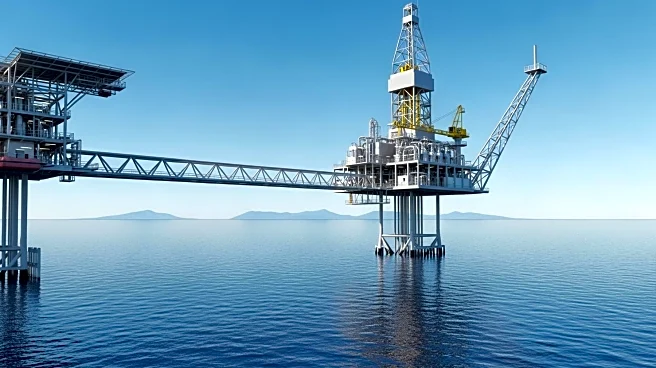What's Happening?
Equinor has started production at the Bacalhau field in Brazil's Santos basin, marking a significant milestone for one of the largest deepwater developments globally. The project is Equinor's largest international
offshore investment, with recoverable reserves exceeding 1 billion barrels of oil equivalent and a peak production capacity of 220,000 barrels per day. The field, located in the pre-salt region offshore Brazil, began production on October 15, operated by Equinor alongside partners ExxonMobil Brasil, Petrogal Brasil, and Pré-sal Petróleo SA. The ultra-deepwater field is developed using an advanced Floating Production, Storage and Offloading unit, featuring combined-cycle gas turbine technology to reduce carbon intensity.
Why It's Important?
The Bacalhau project represents a new generation of oil developments that emphasize scale, cost-efficiency, and lower carbon emissions. It strengthens Equinor's oil and gas production longevity and secures value creation for decades. The project is expected to support around 50,000 jobs and deliver long-term economic benefits to Brazil. With CO₂ emissions of about 9 kg per barrel of oil equivalent, Bacalhau sets a benchmark for low-emission offshore operations, aligning with global sustainability goals. The field will contribute significantly to Equinor's target of generating over $5 billion in free cash flow by 2030 from its international portfolio.
What's Next?
Equinor plans to assume full operation of the FPSO facilities after MODEC's initial operating phase concludes. The Phase 1 development includes 19 production and injection wells, which will come online sequentially as the project ramps up. The Bacalhau project is expected to have a 30-year lifespan, providing substantial contributions to Brazil's economy and Equinor's international growth strategy.
Beyond the Headlines
The Bacalhau field's development highlights the growing importance of Brazil as a core growth area for international oil companies. It underscores the shift towards more sustainable and efficient energy production methods, reflecting broader industry trends towards reducing carbon footprints while maintaining economic viability.











